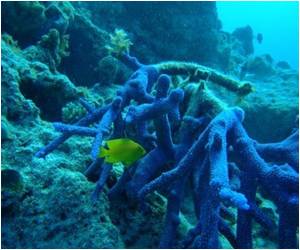Pollution caused by human activity can stunt the growth of coral reefs, say researchers.

Although coral reefs grow under the sea it seems that they have been responding to changes in the concentration of particulate pollution in the atmosphere, according to a paper published this week in the journal Nature Geoscience by a team of climate scientists and coral ecologists from the UK, Australia and Panama. Corals are colonies of simple animal cells but most rely on photosynthetic algae for their energy and nutrients.
Lead author Lester Kwiatkowski, a PhD student from Mathematics at the University of Exeter, said: "Coral reefs are the most diverse of all ocean ecosystems with up to 25 percent of ocean species depending on them for food and shelter. They are believed to be vulnerable to climate change and ocean acidification, but ours is the first study to show a clear link between coral growth and the concentration of particulate pollution in the atmosphere."
Dr Paul Halloran of the Met Office Hadley Centre explained: "Particulate pollution or 'aerosols' reflect incoming sunlight and make clouds brighter. This can reduce the light available for coral photosynthesis, as well as the temperature of surrounding waters. Together these factors are shown to slow down coral growth."
The authors used a combination of records retrieved from within the coral skeletons, observations from ships, climate model simulations and statistical modelling. Their analysis shows that coral growth rates in the Caribbean were affected by volcanic aerosol emissions in the early 20th century and by aerosol emissions caused by humans in the later 20th century.
The researchers hope that this work will lead to a better understanding of how coral growth may change in the future, taking into account not just future carbon dioxide levels, but also localised sources of aerosols such as industry or farming.
Advertisement
Source-ANI












